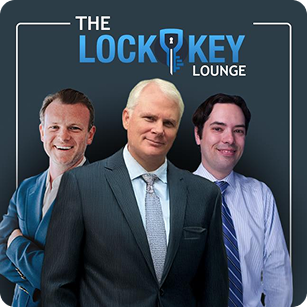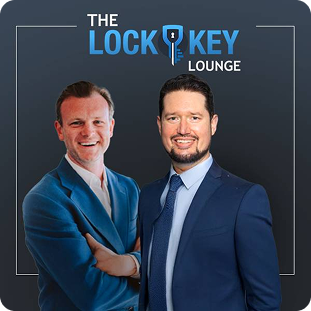
Welcome to The Lock & Key Lounge, the official podcast from ArmorText, the leader in secure out-of-band communications. Each episode brings you into the conversation with the sharpest minds in cybersecurity, law, critical infrastructure, intelligence, and government. We go beyond the headlines and vendor buzzwords to unpack real-world challenges—from incident response and cybercrime innovation to legal landmines, boardroom decisions, and threat intelligence at scale.
September 10, 2025
When adversaries can read the playbook—searching email, SharePoint, Teams/Slack, and even joining incident response calls—communication becomes the attack surface. That’s why the FBI now explicitly urges organizations to “plan to use out-of-band communications when normal channels like email and VoIP are compromised.” This episode is about preparedness: defining OOB comms, getting executive buy-in, and exercising realistic failovers so “if you can’t trust the network,” you can still run the response.
We’re joined by Aubrey Wade to explore why secure out-of-band communications have become essential infrastructure, and how organizations are building resiliency when it matters most.
August 27, 2025
Today, we’re zeroing in on a uniquely challenging scenario—what happens when the insider threat isn’t an employee at all, but rather a remote worker posing under false pretenses, potentially linked to adversarial nations like the DPRK. Landon Winkelvoss is here to help us understand how these investigations play out, what legal and operational pitfalls to avoid, and why secure, out-of-band communications become critical during these sensitive internal investigations.
August 13, 2025
Today we’ll explore the legal landmines that organizations face when uncovering remote workers connected to adversarial states like the DPRK. We’ll unpack critical questions about liability, disclosure obligations, compliance pitfalls, and sanctions risks—helping legal teams prepare to navigate the regulatory maze following remote worker deception discoveries.
July 30, 2025
When the forecast calls for hurricanes, floods, wildfires or heat waves, most organizations are focused on physical risk. But what happens when cyber risk rides shotgun with those storms?
In today’s episode, we’ll explore how extreme weather events don’t just disrupt operations—they create windows of opportunity for cyberattacks. Attackers are increasingly timing ransomware, DDoS attacks, and other campaigns to coincide with disasters, when resources and attention are focused elsewhere.
Joining us to help make sense of this new world we live in, is Sunny Wescott, Chief Meteorologist and Federal Emergency Response Official.
July 16, 2025
Why nonprofit organizations are bigger cyber targets than most realize—and how the NGO-ISAC is helping defend the sector.
NGOs face a cyber threat landscape that’s as serious—if not more —than private sector organizations. Partly because they often face those challenges with fewer resources, leaner teams, and less public awareness of their risk profiles.
Today we’re joined by our friend Frank McGothigan, CISO of the Ford Foundation and VP of Member Services at the NGO-ISAC, we’ll explore what lessons private sector can learn from the approach NGOs are taking, how high-profile boards and leadership teams present unique cybersecurity challenges, the formation of the NGO-ISAC, why threat sharing and collective defense is essential for this sector.
July 02, 2025
In Part 2 of our conversation in The Lock & Key Lounge with RL Leaders, we put theory into action. From high-stakes ransomware scenarios to rogue Signal chats and weather-induced chaos, we test the limits of imagination in security response simulations.
Traditional tabletop exercises have a reputation for being, well, a little dry. Picture it—stale slides, scripted injects, and facilitators who may or may not be able to keep an audience engaged. But what if we could change that? What if tabletop exercises felt more like high-stakes crisis simulations, pulling participants into a dynamic, unfolding story rather than another box-checking exercise?
That’s exactly what we’ll explore today with Erik and Brian of RL Leaders—a team that has brought Hollywood-style immersive storytelling to national security exercises for years. Now, they’re bringing that expertise to the private sector. We’ll talk about why production value and narrative arcs matter, how they’ve successfully used these techniques in the Intelligence Community and DoD, and what’s next for executive tabletop exercises.
And to prove it’s not just talk, we’re putting them to the test. We’ll take a real executive-focused tabletop module from one of our ArmorText & Crowell & Moring Cyber Resilience guides and let them reimagine it—showing us firsthand how better storytelling can make all the difference.
Jun 18, 2025
Traditional tabletop exercises have a reputation for being, well, a little dry. Picture it—stale slides, scripted injects, and facilitators who may or may not be able to keep an audience engaged. But what if we could change that? What if tabletop exercises felt more like high-stakes crisis simulations, pulling participants into a dynamic, unfolding story rather than another box-checking exercise?
That’s exactly what we’ll explore today with Erik and Brian of RL Leaders—a team that has brought Hollywood-style immersive storytelling to national security exercises for years. Now, they’re bringing that expertise to the private sector. We’ll talk about why production value and narrative arcs matter, how they’ve successfully used these techniques in the Intelligence Community and DoD, and what’s next for executive tabletop exercises.
And to prove it’s not just talk, we’re putting them to the test. We’ll take a real executive-focused tabletop module from one of our ArmorText & Crowell & Moring Cyber Resilience guides and let them reimagine it—showing us firsthand how better storytelling can make all the difference.
Jun 04, 2025
Threat intelligence sharing is a critical pillar of cybersecurity, yet not all programs are equally effective.
The E-ISAC has distinguished itself as one of the most successful models for cross-industry collaboration, providing timely, actionable intelligence to its participants through various initiatives, including the widely successful Cybersecurity Risk Information Sharing Program (CRISP).
So today we’re sitting down with Matt Duncan, to discuss why their approach to intelligence sharing has been so effective,
We’ll explore the role of trust—in people, in platforms, and in the responsible use of shared intelligence— plays in effective sharing community.
We’ll also dive into what makes a threat intelligence network thrive and what improvements E-ISAC hopes to make in the future.
May 21, 2025
The reliability of the electricity sector is increasingly tested by both physical and cyber threats. Large-scale exercises like GridEx have played a critical role in shaping how industry leaders, asset owners, and operators respond to crises. In this episode, we sit down with Jesse Sythe, Program Manager for GridEx at E-ISAC, to discuss the role of these exercises in enhancing industry-wide resilience.
We’ll explore how GridEx has evolved over the years, the thought leadership that has emerged from key coordinating bodies like the ESCC, and what it takes to ensure executive-level engagement in response and remediation. With GridEx VIII on the horizon, Jesse will share insights into the most pressing threats facing the sector and how lessons learned from these exercises can be applied beyond the grid to other critical infrastructure sectors.
We’ll also address the recent policy changes affecting the ESCC and what that means for industry coordination going forward.
May 08, 2025
First, we’re joined again by Joe Slowik, formerly a Principal Critical Infrastructure Threat Intelligence Engineer at MITRE and now Director for cybersecurity alerting at Dataminr. Joe’s career spans the U.S. Navy, national labs, and private sector security teams—where he’s led efforts to track adversary behavior and build resilient cyber defense programs.
He recently joined us for a previous episode of The Lock & Key Lounge, and today’s conversation picks up where that one left off—so if you haven’t already, be sure to check it out for added context.
We’re also joined by Tim Chase, Program Director at GRF, who leads the Manufacturing-ISAC and the Energy Analytic Security Exchange. Tim has built some of the most effective threat-sharing communities in the country—connecting private sector operators with government partners in real time.
We’ll talk about how those communities are built, what trust looks like in practice, and why threat sharing is no longer just a best practice—it’s a business imperative.
May 06, 2025
Now, on this episode, we’ll be exploring a question that has been on a lot of people’s minds — What happens when the federal agencies tasked with cybersecurity begin to pull back? As workforce reductions hit CISA and the Cyber Safety Review Board is disbanded, many are left wondering how critical infrastructure and national cybersecurity posture will adapt. In this episode, we speak with Joe Slowik about the real-world consequences of these decisions, what gaps they leave behind, and whether the private sector can step in effectively.
We’ll also explore how threat actors like Salt Typhoon and Volt Typhoon fit into this new landscape, and hear Joe’s reflections on transitioning between the public and private sectors during a time of instability.
May 01, 2025
While this episode of The Lock & Key Lounge was initially slated to continue our discussion with Marisa on the advisability of using consumer E2EE apps like Signal for government communications, recent developments from ‘Signal-gate’ compel us to focus sharply on the serious legal and operational pitfalls exposed by such guidance. Today, we’ll delve into how these recommendations, aimed at bolstering operational security, clash with the intricate requirements of laws like the Presidential Records Act and broader operational security concerns that extend beyond mere encryption.
April 30, 2025
After the Salt Typhoon breaches in telecom, both the FBI and CISA urged Americans—especially businesses—to use consumer end-to-end encrypted messaging apps for greater data security. However, other federal regulators (e.g., DOJ, SEC, FTC) have made it clear that ephemeral messaging can land corporations in hot water if key data is lost or destroyed. In other words, enterprises could unknowingly violate recordkeeping, discovery, and compliance obligations if they adopt ephemeral messengers (Signal, WhatsApp, iMessage, etc.) without implementing robust retention or governance. We’ll explore these conflicting signals and ask how companies can protect themselves.











